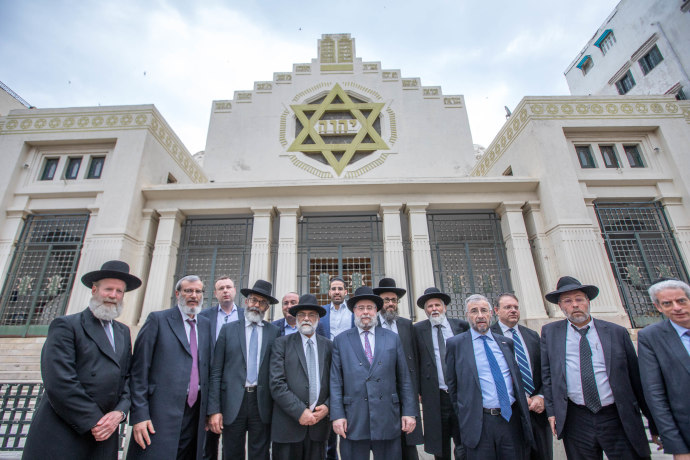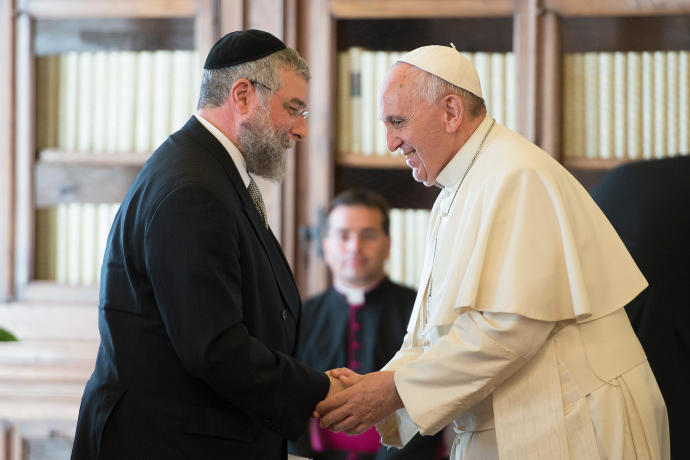Courtly, well-spoken and articulate, Rabbi Pinchas Goldschmidt sports a certain continental gravitas. Born in Zurich to a family that had lived in Switzerland for four generations, Goldschmidt served as the chief rabbi of Moscow from 1993 to 2022, until he stepped down from his position after protesting the Russian attack on Ukraine.
Goldschmidt, who speaks seven languages, holds the influential position of president of the Conference of European Rabbis, the primary Orthodox rabbinical alliance in Europe, uniting more than 700 religious leaders of mainstream synagogue communities.
Today, Goldschmidt divides his time between CER’s Munich headquarters and Jerusalem. He recently sat with this writer for a discussion with the Post about his work as president of the Conference of European Rabbis, the factors that led to his decision to leave Moscow, his thoughts about recent goings-on in Israel and his activities in this country.
The CER was created in 1956 in an effort to rebuild the Jewish communities of Europe that had been decimated by World War II and its aftermath. England and Switzerland were the only countries in Europe that were untouched by the Holocaust. The Iron Curtain divided Europe into the democratic countries of Western Europe and the Soviet satellite states, casting most Eastern European Jewish communities into a struggle for survival.
As a result of the conference’s union with the rabbinates of the stronger Western European Orthodox communities, the vast majority of mainstream communities throughout the continent retained Orthodox affiliation and rabbinical leadership. Today, the CER unites over 700 communal rabbis from Dublin to Khabarovsk.

The Conference of European Rabbis protects the religious rights of Jews in Europe and is the voice of Judaism for the European continent. It also functions as a rabbinical authority, with expert committees that certify conversions and kashrut operations and pass rabbinical legal decisions affecting the broader Jewish community. It is recognized by Israel’s Chief Rabbinate and rules on matters of personal Jewish status, such as divorce and conversion, through its Rabbinical Courts in Paris, Strasbourg, Amsterdam, Rome, Moscow, Kyiv and Vienna, united under the umbrella of the European Rabbinical Court. The CER plans to open its new headquarters in Munich this summer, and will provide a platform for conferences and seminars for the European rabbinate.
In June 2011, Goldschmidt was elected as the organization’s fourth president, and he has held the organization’s top spot for the past 12 years. Goldschmidt points out that in addition to EU countries with large Jewish populations, there are many small Jewish communities in Europe that are benefiting from the work of the conference.

In recent years, the conference has begun to offer training seminars for rabbis to equip them with appropriate tools and skills, has enabled and encouraged networking of rabbis throughout Europe, and has provided financial support for synagogue projects and construction of mikvaot (ritual baths). Recently, the CER has also initiated training sessions for the wives of CER rabbis, enabling them to provide educational guidance and assistance for their communities as well.
One of the conference’s recent major accomplishments, says Goldschmidt, was the passing of a law in the Knesset extending the jurisdiction of Israeli Rabbinical Courts to cases of agunot of non-Israelis.
The term “aguna” (“chained woman”) refers to a Jewish woman who is trapped in her marriage because she cannot obtain a get (Jewish bill of divorce) from her husband. Nowadays, the term is used most frequently in cases when the husband has refused to grant a divorce.
“In Europe, 90% of the Jews who marry inside the community do so according to Jewish law,” says Goldschmidt.
“There are many people who married according to Jewish law but then separated. The wives could not obtain a divorce because the husband didn’t care and didn’t offer a Jewish divorce, or he remarried in a civil marriage without obtaining a Jewish divorce. We couldn’t force the husband to give a bill of divorce to his wife in order to free her.” As a result, he says, many agunot in Europe could not remarry.
The rabbis of the CER devised a plan based on the reality of the European Jewish experience.
“Every European Jew is tied to living in Israel in some way,” explains Goldschmidt. “Almost every Jew in Europe has parents or family living in Israel and has visited Israel.” Moreover, he adds, European Jews think of Israel as a place of refuge where they may move someday, should Jewish life deteriorate in Europe.
Bearing this in mind, the CER expanded the jurisdiction of the Israeli Rabbinical Courts to aguna cases outside of Israel. A wife who cannot obtain a divorce from her husband can demand that the Israeli Rabbinical Court sanction the husband if he doesn’t come to the court in Israel to settle the case. The next time he comes to Israel, he can be denied exit from the country or sanctioned. “In 95% of the cases, he will give a get on the spot,” says Goldschmidt.
The second mechanism is implemented when a Rabbinical Court in Europe approaches a husband who has been separated for a number of years and has not granted a divorce. The European Rabbinical Court will demand that the husband appear in the court, or they will ensure that an Israeli Rabbinical Court sanction him. “This is enough of a threat for a husband to appear in Europe before the beit din,” says Goldschmidt. “It has given teeth to the Rabbinical Courts of the communities to get husbands to take care of this issue and not leave their wives chained as agunot. It is a huge success story.”
The Conference has also been active in assisting Ukrainian Jewish refugees through the Yuri and Julia Milner Foundation, established at the beginning of the war, helping them integrate into Jewish communities throughout Europe.
Goldschmidt speaks forthrightly about Russia’s war with Ukraine and how it has affected the situation of the Jews living in Russia.
“I left Russia on March 22, 2022, two weeks after the war began,” he says. “I left because pressure was placed on community leaders to support the war, which I was not prepared to do. We decided to engage in helping the Jewish refugees from Ukraine, and the political system turned overnight from authoritarian to semi-totalitarian. I felt that I had to leave.”
Goldschmidt called on Russia’s Jews to leave when the situation deteriorated. “In September, I called on everyone who could leave, to leave Russia.”
Over the past 14 months, he says, 30% of Russian Jewry has left the country, with most coming to Israel. In fact, he adds, the number of Russian Jews who have come to Israel is more than twice that of Ukrainian Jews who have arrived.
What was behind his suggestion that Russia’s Jews depart?
“The reason I felt that whoever can leave should leave,” explains Goldschmidt, “was because the general political situation had been deteriorating, which could lead to an increase in antisemitism. We felt that the Jews could become hostages of the political situation.”
Recent events, including the arrest of Wall Street Journal reporter Evan Gershkovich, who was accused of espionage, and the sentencing of Russian opposition politician Vladimir Kara-Murza to 25 years in jail for speaking against the government and the war with Ukraine, seem to have borne out these fears. Both Gershkovich and Kara-Murza are Jewish.
“I fear that the Jews can become hostages in certain political situations,” says Goldschmidt. “In general, Jewish hostages have more bargaining value than other hostages. You have to understand that right now in Russia, there is no law.”
During his visits to Israel, Goldschmidt works on rabbinic development and assists new immigrants and refugees from the war in Europe, helping them by providing the necessary documentation for their aliyah, as well as financial and logistical assistance. With his frequent visits to Israel, he is fully aware of the difficulties surrounding the issue of judicial reform and explains how events in Israel influence the lives of European Jewry.
“During the last few years,” says Goldschmidt, “we have been battling an ongoing wave of legislation against religious freedom, especially regarding ritual slaughter and circumcision.”
Goldschmidt explains that while the prime target of this legislation has been the 40 million Muslims living in Europe, the Jews have been the collateral damage. A coalition of far-left-wing animal rights and children’s rights organizations have teamed up with far-right parties to make life for Jews in Europe more difficult.
“We have always been extremely vocal against the far Right in Europe for their racism. The problem is that today in Israel, with the far-right in the government, we are getting responses from European politicians telling us, ‘You’re telling us what to do. Look what’s happening with you in Israel.’ Basically, the political situation in Israel directly affects the Jews and the life of Jews outside of Israel. The life of Jews outside Israel is almost totally interconnected with life in Israel.”
To support his point of view, he mentions a recent incident in Barcelona when graffiti was written on a synagogue wall accusing the Jews of genocide and apartheid against the Palestinians. Just a few months earlier, he notes, the mayor of Barcelona decided to sever ties with Tel Aviv, its sister city. “We see that there is a correlation between relations in Israel and local antisemitism.”
Goldschmidt notes that Iran’s recent activities have not helped matters and describes a recent attempt by a terrorist cell composed of members of Iran’s Revolutionary Guard Corps to attack a kosher restaurant in Athens.
“I hope that the Israeli government can soon come to a consensus with the opposition in its quest for reform in order to make sure that we can free our resources and minds to renewed threats coming from outside of Israel,” says Goldschmidt.
Despite the threats and difficulties, Goldschmidt says that Jewish life is thriving in many communities in Europe. Last year he visited Paris, where a new Jewish community center was recently completed.
“When people are building new community centers,” he says, “it is a sign of hope, of being strong and certain of [the communities’] future. We are seeing new synagogues, new communal schools and a new interest in Judaism,” he reports.
Goldschmidt also points out that attacks in Europe against Jewish community centers and synagogues have decreased over the past several years. He ascribes this to several factors, such as EU legislation restricting online antisemitism and supporting terrorist activity on the Internet; better coordination among EU authorities to combat terrorism and prevent attacks before they occur; and support provided to Jewish communities, principally in Western Europe, to improve security in Jewish community structures. He credits Katharina von Schnurbein, EU coordinator against antisemitism, for her efforts, noting that most European countries now have envoys to combat antisemitism.
Pinchas Goldschmidt feels he is fulfilling an essential role as president of the CER. It is impossible, he says, to return to Moscow as long as the current political situation remains. At some point, he may consider applying for a rabbinical position in Israel. Until such time, though, he will maintain his frequent commute between European Jewish communities and Jerusalem, providing leadership and guidance for European Jewry.
This article was written in cooperation with the Conference of European Rabbis.
